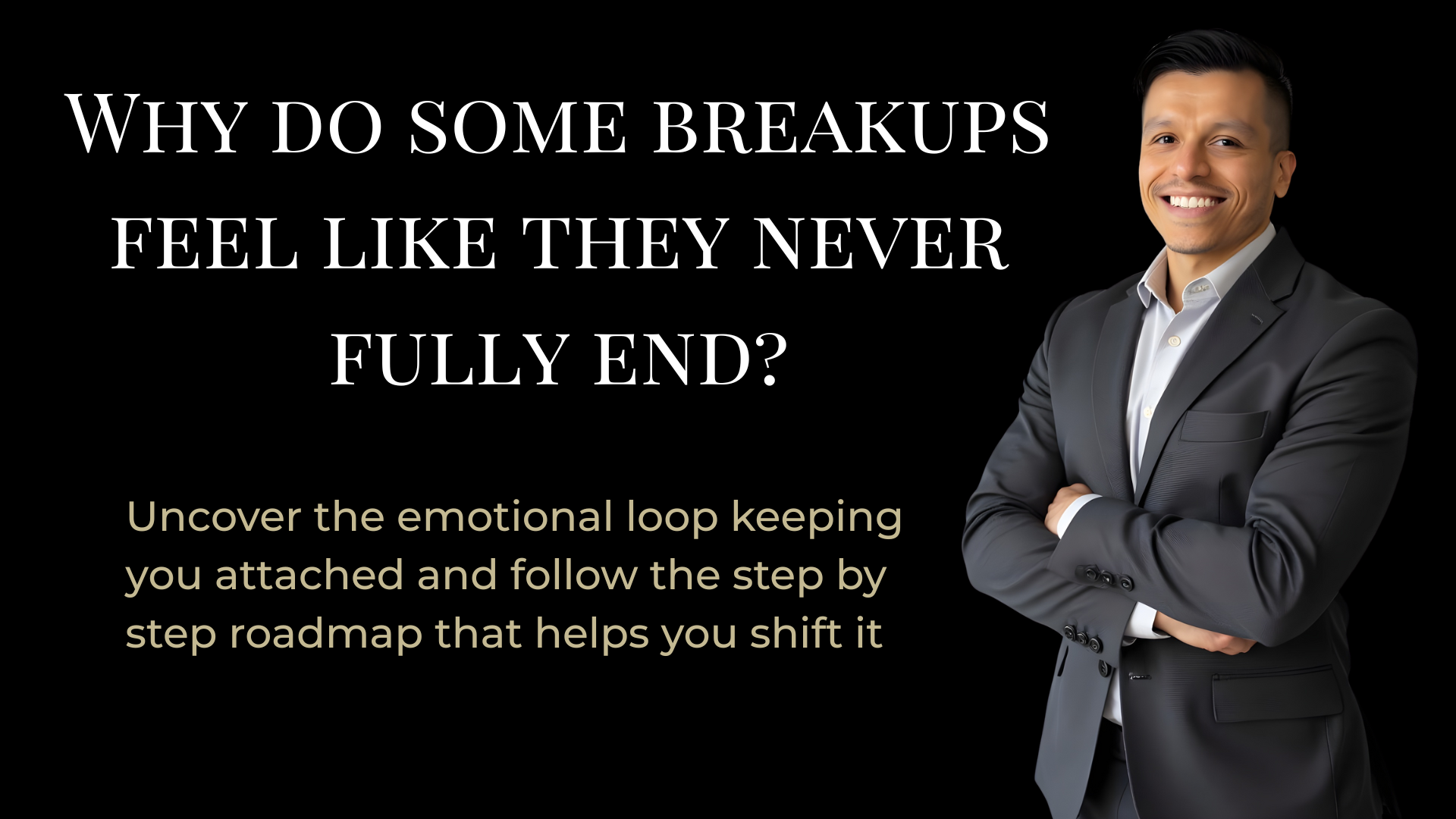
The Surprising Thing That Happens When You Stop Trying to Get Over Him
Here's something nobody tells you about breakups: the harder you try to get over someone, the more stuck you become. It's one of those cruel paradoxes that makes absolutely no sense until you understand what's really happening beneath the surface.
You've probably been there. Maybe you're there right now. That place where you wake up every morning with a mental checklist of recovery tasks. Delete another photo. Avoid that coffee shop. Force yourself to feel nothing when his name pops up on your phone. You approach getting over your ex like a project at work, applying the same drive and determination that made you successful in every other area of your life.
But here's what's actually happening when you white-knuckle your way through heartbreak: every time you resist the feelings, every time you push against the memories, every time you tell yourself you "should be over this by now," you're actually creating more energetic connection to the very person you're trying to forget.
Why Your High-Achiever Mindset Is Working Against You
Think about how you've approached every other challenge in your life. When you wanted that promotion, you made a plan. When you decided to get in shape, you scheduled workouts and tracked progress. When you set a goal, you bulldozed through obstacles until you achieved it. This approach has served you well in your career, your fitness, your finances.
So naturally, when your relationship ended, you applied the same methodology. You probably researched the "stages of grief," set timelines for when you should feel better, and created strategies to "move on faster." You might have even blocked him on social media, thrown yourself into work, or jumped into dating apps to prove to yourself that you're "over it."
But emotional recovery doesn't follow the same rules as professional achievement. The very qualities that make you successful in other areas - your determination, your need for control, your goal-oriented mindset - can actually keep you trapped in a cycle of resistance that prevents genuine recovery.
When you fight against what you're feeling, when you judge yourself for still caring, when you force yourself to "just move on already," you create internal tension. That tension keeps you energetically connected to your ex in a way that actually prevents the natural process of emotional release.
The Energy of Resistance vs. The Power of Acceptance
Picture this scenario: imagine you're holding a beach ball underwater in a swimming pool. The harder you push it down, the more force it exerts back up toward the surface. The moment you stop pushing, the ball naturally rises to the top and eventually floats away on the current.
Your emotions work the same way. When you resist them, judge them, or try to force them away, they push back with equal force. But when you stop fighting against what you're feeling, something unexpected happens. The intensity naturally begins to shift and change on its own.
This doesn't mean wallowing in your feelings or staying stuck in the past. There's a crucial difference between acceptance and resignation. Acceptance means acknowledging what is without judgment. It means allowing yourself to feel whatever you're feeling without making it wrong or trying to change it immediately.
Most guys have never learned this distinction. We're taught that strong men push through discomfort, that we should be able to logic our way out of emotional situations, that taking time to process feelings is somehow weak or self-indulgent. But this approach creates a prison of resistance that keeps you bound to the very experiences you're trying to escape.
What Really Happens When You Stop Fighting
When you finally stop trying so hard to get over him, several surprising things begin to unfold. First, you'll likely notice a sense of relief. The exhausting work of constantly monitoring your thoughts and feelings can finally cease. You're no longer spending mental energy on the impossible task of forcing yourself to feel differently than you do.
Second, you create space for your emotions to move through their natural cycle. Feelings, by their very nature, are temporary and fluid. They arise, peak, and naturally subside when we don't interfere with the process. But when we resist them or try to control them, we interrupt this natural flow.
Third, you begin to reclaim the energy that was previously locked up in resistance. Think about how much mental bandwidth you've been using to avoid certain thoughts, suppress certain feelings, or force yourself to behave in ways that don't align with your inner experience. When you stop fighting against what is, all that energy becomes available for other things.
This is where the real magic happens. Instead of spending your energy on resistance, you can redirect it toward activities and relationships that actually nourish you. You start making choices from a place of genuine desire rather than reactive avoidance.
The Counterintuitive Path to Emotional Freedom
Here's what this looks like in practice. Instead of immediately deleting every photo of your ex, you might allow yourself to look at one and notice what comes up without trying to change or fix the feeling. Instead of forcing yourself to go out and be social when you're not ready, you might honor your need for solitude without judging it as pathetic or wrong.
This approach requires a fundamental shift in how you relate to your own experience. Rather than seeing difficult emotions as problems to solve, you begin to understand them as information. They're telling you something important about what mattered to you, what you valued in the relationship, and what you might want to create in the future.
When you stop making your feelings wrong, they lose their power to torment you. When you stop trying to control your thoughts about your ex, those thoughts naturally begin to shift and change. When you stop forcing yourself to "move on," you create the conditions for authentic transformation.
This doesn't mean you become passive or resigned to suffering. It means you learn to work with your emotional experience rather than against it. You develop the capacity to feel without being overwhelmed, to remember without being destroyed, to care about someone while still honoring your own needs and boundaries.
Why Traditional Breakup Advice Fails Deep Connections
Most breakup advice assumes that all relationships are created equal, that you can apply the same strategies whether you dated someone for three months or three years. But when you've experienced a deep emotional connection with someone, when you've shared vulnerable parts of yourself, when you've built dreams and plans together, the standard "just focus on yourself and move on" advice feels hollow and inadequate.
The deeper the connection, the more integrated that person becomes in your sense of self and your vision for the future. Trying to simply cut them out and pretend they never mattered is like trying to remove a load-bearing wall from your house without any structural adjustments. The whole thing feels unstable and wrong.
Deep connections require a different approach to recovery. They need time, patience, and a willingness to honor what was meaningful about the relationship while still allowing space for growth and change. They require you to develop new relationship skills, not just distraction techniques.
This is why so many high-achieving men find themselves stuck in cycles of incomplete recovery. They apply surface-level strategies to deep emotional experiences and wonder why nothing seems to work long-term. They might feel better for a few days or weeks, but then something triggers them and they're right back where they started.
The Shift That Changes Everything
The fundamental shift happens when you move from trying to control your recovery to learning how to navigate it. Instead of fighting against your experience, you develop skills for moving through it with greater ease and wisdom. Instead of judging your pace, you learn to trust your own process.
This shift often begins with a simple recognition: what you're feeling makes complete sense given what you experienced. Your attachment to this person wasn't random or pathological. It developed for real reasons. The relationship mattered to you. The loss is significant. Your heart is responding exactly as hearts respond when something important ends.
From this place of self-compassion, you can begin to approach your recovery with curiosity rather than judgment. What is this feeling trying to tell you? What did you value about this relationship that you want to cultivate in the future? How can you honor what was meaningful while still creating space for what's next?
This approach transforms recovery from a battle you're fighting to a process you're navigating. It shifts your relationship with your own experience from adversarial to collaborative. You're no longer working against yourself; you're working with yourself.
Creating Space for Genuine Transformation
When you stop trying to force recovery and start allowing it, you create conditions for genuine transformation to occur. This transformation is different from simply "getting over" someone. It involves integrating the experience, learning from it, and allowing it to contribute to your growth rather than just trying to escape from it.
You begin to see that the goal isn't to return to who you were before the relationship. That version of you no longer exists. You've been changed by the experience of loving and losing, and trying to pretend otherwise keeps you stuck in an impossible task.
Instead, the goal becomes discovering who you are now, after this experience. What parts of yourself did this relationship reveal? What capacities for love and connection did you discover? How can you carry the best of what you shared forward into your future relationships while releasing what no longer serves you?
This approach leads to genuine freedom rather than just emotional numbing. You're not trying to become someone who never loved your ex. You're learning to become someone who can hold that love alongside everything else in your life without being controlled by it.
The Relief of Stopping the Fight
Perhaps the most immediate benefit of stopping the fight against your feelings is simple relief. The constant internal pressure to be somewhere other than where you are is exhausting. The persistent judgment about how you "should" be feeling by now is a form of self-torture that serves no constructive purpose.
When you finally give yourself permission to feel whatever you're feeling, when you stop making your recovery timeline wrong, when you release the pressure to perform emotional strength for others, you can finally breathe. You can finally rest in your own experience without constantly trying to escape it.
This relief creates space for your natural wisdom to emerge. When you're not spending all your energy on resistance, you can actually hear what your heart is trying to tell you. You can distinguish between the voice of authentic guidance and the voice of fear or social conditioning.
Many men discover that underneath their resistance to feeling bad about the breakup, they're actually afraid that feeling bad means something is wrong with them. They're worried that caring this much makes them weak or pathetic or somehow less than other men who seem to "bounce back" more quickly.
But caring deeply is actually a sign of your capacity for meaningful connection. The depth of your feelings reflects the authenticity of what you shared. Rather than seeing your emotional response as evidence of weakness, you can begin to recognize it as evidence of your humanity and your heart's ability to form genuine bonds.
The surprising thing that happens when you stop trying to get over him isn't that you stay stuck forever. It's that you finally create the conditions for real movement, real growth, and real recovery. You stop fighting against yourself and start working with yourself. You stop trying to force a timeline and start trusting a process.
This shift doesn't make the process painless, but it does make it purposeful. It doesn't eliminate difficult moments, but it transforms your relationship with them. You move from being a victim of your feelings to being someone who can navigate them with skill and self-compassion.
The path forward isn't about becoming someone who never loved him. It's about becoming someone who can love freely without losing yourself, who can form deep connections without becoming dependent on them for your sense of worth, who can experience loss without being destroyed by it. That's not getting over someone. That's growing beyond who you used to be.
The question isn't whether you'll recover from this relationship. The question is who you'll become through the process of recovery. And that transformation begins the moment you stop fighting against where you are and start working with what is.
Ready to Break Free from Heartbreak?
Discover the Proven Steps to Rebuild Confidence and Thrive in Life After Love.
Join a Community That Gets You and Helps You Thrive!
Join a community of high-achieving gay men receiving exclusive tools, tips, and support to overcome heartbreak and create a life they love.
We respect your privacy. Your information is 100% secure and will never be shared, sold, or used for spam. You can unsubscribe at any time.


